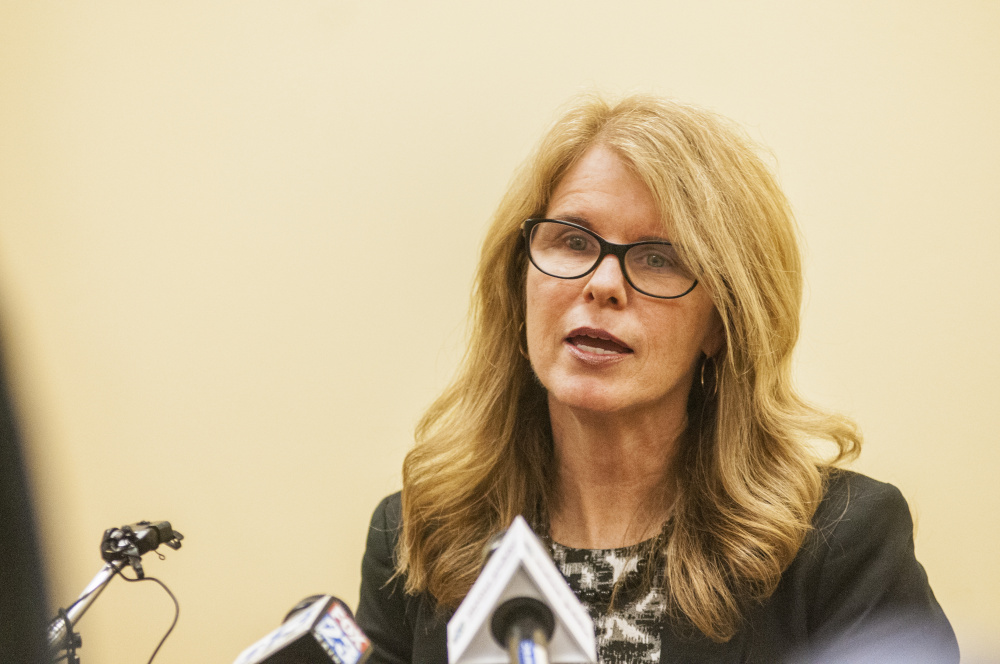During her six years as Maine commissioner of health and human services, Mary Mayhew liked to talk about “the truly needy.”
She would roll out the phrase when she was explaining why Maine should offer less help, pay for fewer services or step back from its responsibilities to some people so there would be enough to pay for supports to others whom she considered more deserving.
Mayhew announced her resignation Wednesday at a “news conference” during which she refused to answer questions, so it’s still unclear what truly needy group she had in mind.
It certainly couldn’t have meant children: The rate of children living in deep poverty, or $800 in income a month for a family of three, has skyrocketed under her watch, growing eight times faster than the national average.
She couldn’t have meant low-income senior citizens. She pushed through cuts to the Drugs for the Elderly program, which had helped thousands of needy Mainers buy prescription medications.
And she must not have meant people with mental illness or intellectual disabilities, because she promoted cuts to reimbursement rates for their care, limiting community-based options that were already inadequate to meet their needs.
Mayhew called all this “welfare reform,” but that would be accurate only if tearing down a house could be called “remodeling.” Maine is less healthy and less humane after Mayhew’s tour as the official in charge of the state’s health and human services.
Using the phrase “truly needy” was one of the ways that Mayhew pitted Mainers against each other. She and her boss, Gov. Paul LePage, were able to exploit the notion that rampant welfare fraud was responsible for the high cost of human services, feeding prejudice against the poor.
And she promoted the convenient fiction that providing basic services like food and health care was bad for people’s character, and would prevent them from making themselves self-sufficient. Instead of being an advocate for people in need, she became their chief accuser.
Mayhew’s signature effort has been her leadership in the fight against accepting federal funds for Medicaid expansion through the Affordable Care Act. Maine has turned down $1 million a day in federal health spending over the last three years, denying coverage to as many as 70,000 people who have no insurance and can’t afford to see a doctor.
Mayhew was instrumental in awarding a nearly $1 million no-bid contract to partisan ideologue Gary Alexander to “study” Maine’s welfare system, and provide bogus “facts” about the cost of accepting the federal expansion funds. The report turned out to be crudely plagiarized, and although LePage blocked partial payment to the author after he was caught, the governor and Mayhew continued to cite the report’s highly suspect projections as fact.
Maine’s stand on Medicaid expansion has not made Maine people more healthy, but it has driven up health care costs by putting pressure on providers who supply charity care, shifting costs onto fees paid by other patients with private insurance. It has reduced the number of people who receive what Mayhew has taken to calling “medical welfare,” which is her only acceptable yardstick of success.
The clearest consequence of this stand against expanding health coverage has shown itself in Maine’s slow and inadequate response to the opioid crisis, which erupted and metastasized under her administration.
As soon as she took office in 2011, Mayhew championed limiting state support for methadone treatment. She also pushed 14,000 parents and 10,000 “able-bodied” adults without children off MaineCare (Maine’s Medicaid program). As the overdose death toll climbed, treatment options receded because providers like Mercy Hospital could not keep their programs running without a revenue stream.
Last year, Mayhew sat on $500,000 earmarked for more treatment, claiming that providers had not demonstrated that they needed it. 2016 turned out to be the deadliest year on record for drug overdoses, with Mainers dying at a rate of more than one per day. Who knows how many of those lives could have been saved?
There is nothing wrong with thrift, and managing the biggest department in state government requires making tough choices. But if, as rumored, Mayhew plans a career in elected office, Mainers should not forget where she placed her priorities.
Looking out for Maine’s “truly needy” was the job for which Mayhew was hired. Many of those people are worse off today as a result.
Send questions/comments to the editors.



Comments are no longer available on this story